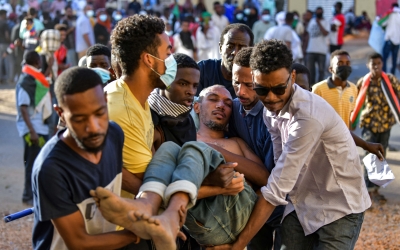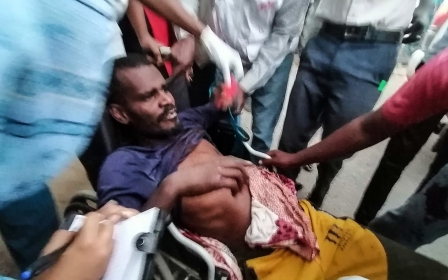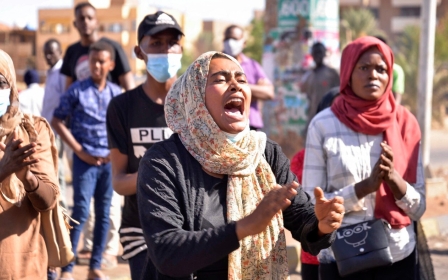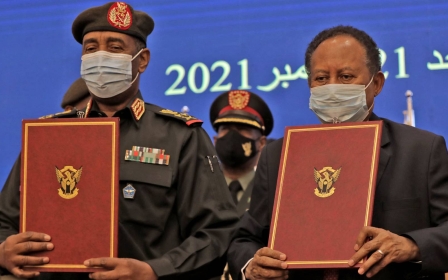Sudan coup: Tens of thousands protest against PM Hamdok and military takeover
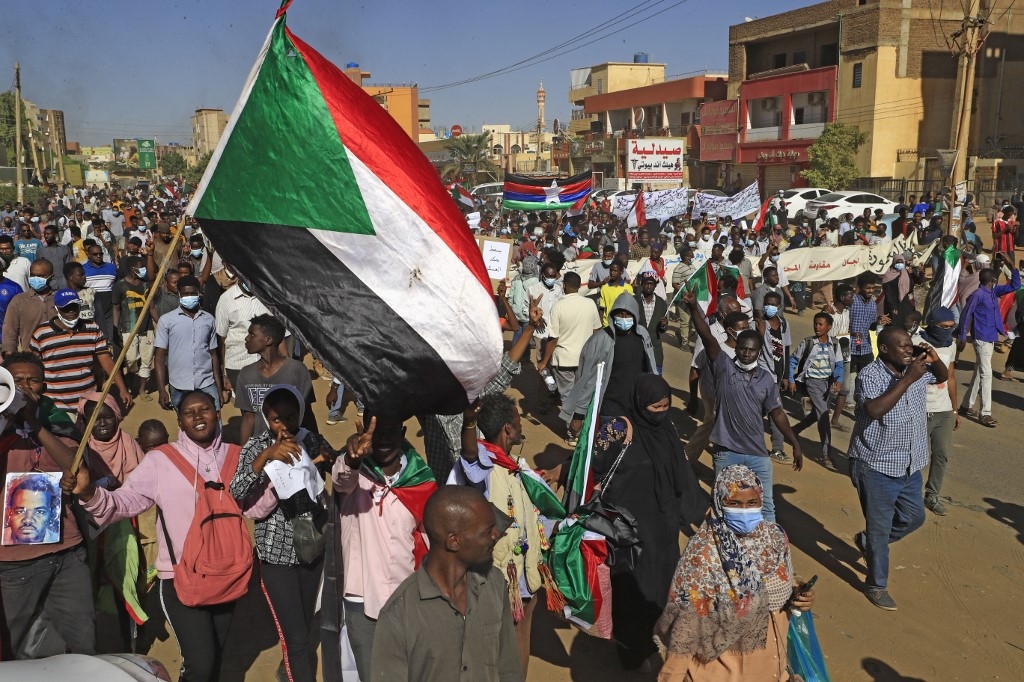
Nationwide protests against Prime Minister Abdullah Hamdok broke out for the first time on Thursday after he signed a deal with Sudan's military last week. The deal effectively ended his house arrest and reinstated him to power.
Tens of thousands joined the protests against Hamdok and the military, with protesters likening the premier to the army.
The protests came after General Abdel Fattah al-Burhan restored Hamdok to his position following international condemnation and mass protests against the 25 October power grab that saw Burhan declare a state of emergency, oust the government and upend a two-year transition to civilian rule.
'Burhan has killed protesters, seized power and hijacked the revolution, and Hamdok stood by him as they signed the deal which would keep them both in power'
- Hassan Mohamed, protester
But Hamdok's reinstatement has angered the Sudanese street, with protesters accusing him of committing "treason" and vowing to continue protesting against the transitional government.
Chanting "the people want the fall of the regime" and "power to the people, a civilian government is the people's choice" - demonstrators gathered in the capital city of Khartoum and its twin city of Omdurman to oppose the military and Hamdok.
New MEE newsletter: Jerusalem Dispatch
Sign up to get the latest insights and analysis on Israel-Palestine, alongside Turkey Unpacked and other MEE newsletters
Security forces fired tear gas to disperse protesters in Omdurman and in the central state of North Kordofan and in North Darfur, witnesses told AFP.
Eyewitnesses confirmed to Middle East Eye that tear gas, rubber bullets and live ammunition were used against protesters, leading to some casualties.
Medical sources also confirmed that several people were injured in Omdurman and Bahri, but the number was yet to be verified. Others confirmed that protesters have been arrested by the security forces in Wad Madani, Nyala and other locations.
'Three Nos'
Hassan Mohamed, a 30-year-old protester at the 40 Station neighbourhood in Khartoum, felt that there was "no difference between Burhan and Hamdok".
"Burhan has killed protesters, seized power and hijacked the revolution, and Hamdok stood by him as they signed the deal which would keep them both in power," said Mohamed.
His feelings were echoed by protest leader Mohamed Anwar who led the demonstrations in the 40 Station neighbourhood in Khartoum.
Speaking to thousands of people in the area, Anwar dubbed the alliance between the military and civilian-led transitional government as an extension of the rule of former President Omar Bashir, ousted in April 2019 after a popular uprising.
“We stick with the three Nos, which are no partnership, no compromise and no negotiations because we have learned the lesson from the first version of the power-sharing between the military and civilians," said Anwar.
Meanwhile, in North Khartoum, protesters chanted "Burhan is dirty" and said he had been "brought to power by Islamists" in reference to people associated with deposed longtime ruler Bashir.
The protests were part of a social media callout for a "martyrs day" demonstration on Thursday to remember the 42 protesters killed in the post-coup crackdown.
Protesters also staged a sit-in at Port Sudan where port workers planned to go on strike for three days in the city with leading members of the port labour committee vowing to close the port to support protests in Khartoum.
Hamdok, who returned to power on Wednesday after being placed under house arrest by the army, said he re-entered negotiations with the military to "stop further bloodshed" and "not squander the gains of the last two years".
A new deal signed by the military and the civilian members of the transitional government vowed to schedule Sudan's first free elections for July 2023.
Twelve out of 17 ministers who called for a civilian-run government resigned on Monday and rejected Hamdok's strategy of engaging with the military.
Volker Perthes, the UN special envoy to Sudan who helped mediate between the military and civilian factions after the coup, said Wednesday that the rallies were "another test of credibility" of the agreement.
He urged authorities to allow demonstrations to go ahead "without bloodshed or arbitrary arrests".
Middle East Eye delivers independent and unrivalled coverage and analysis of the Middle East, North Africa and beyond. To learn more about republishing this content and the associated fees, please fill out this form. More about MEE can be found here.


